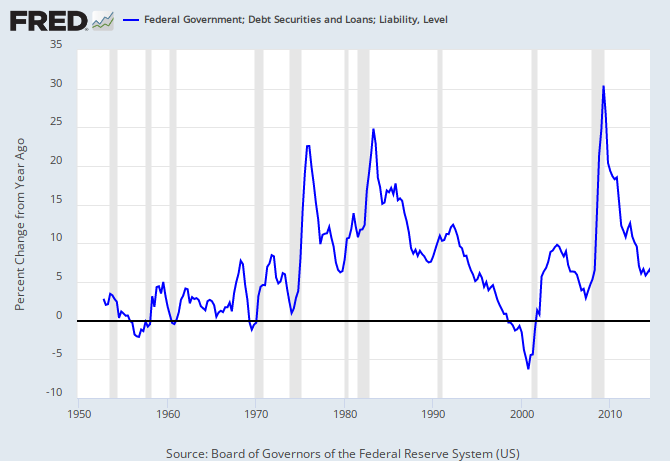Look, I acknowledge the founders were pretty smart. But just because they liked or didn't like something 250 years ago doesn't make it good or bad.
The founders existed in a completely different time. With respect to economics, they couldn't have even begun to imagine the world we live in today, both with respect to things like globalization and the fact that our money is backed by nothing. Today we have a banking system, not a bunch of independent banks. Today the government has the power to create money.
Explain to us why today central banking is inherently bad without making an argument from authority.
Just curious, are you aware that when Jackson repaid the debt, the next year, the economy went into depre a sion? Just as a side note. Every year the government has run a significant sustained surplus (6 times), the economy has followed the next year by going into depression?
The government doesn't have the power to create money...directly. That power rest with the federal reserve. The government is enabled by the federal to spend whatever they wish and thus increase the deficit. Also, the dollar is not backed by nothing. It is backed by the economy of the US.
The founders were concerned with a large central bank because they felt it could/would create banks too big to fail. Sound familiar? Instead of a contained local problem among a few banks with their own notes, large central banks exposure can cause economic pandemics, just like 2008.
During Clinton's Presidency the government ran a surplus and never suffered a recession, so not sure where you got your numbers regarding government debt and recessions.
Here is an excellent article which might cause you to reconsider the worthiness of growing debt without corresponding economic growth.
The government doesn't have the power to create money...directly. That power rest with the federal reserve.
Most of our money supply is created by commercial banks.
Not sure if I agree with that considering over the last 8 years all the QE the Fed has engaged in. Once again, since Toddster is a lazy poster, he hasn't provided any links to support his statement. Perhaps in a non-QE environment that is accurate.
When The Fed Prints Money, What Impact Does It Have On You?
The Federal Reserve, the United States central bank, has “printed” more than $2 trillion since the global economic crisis began in 2008. This has more than tripled the size of its balance sheet. Before this spree of paper money creation began, the Fed held $950 billion in assets; now it holds nearly $3 trillion. Why did they do this and what impact has it had on you, the general public?
Actually, it's not.
The Fed doesn't simply create money.
1) The Fed acquires collateral in the form of US Treasuries (with the unusual exception of MBS' it bought as part of the housing meltdown or QE).
2) When the Board of Governors creates FRNs it SELLS them to the banks. The Banks must trade dollar reserves for physical dollars.
With respect to QE. It started out as a program to reduce the liabilities held by banks. When a banks liabilities exceed its assets it becomes insolvent. Given all the bad debt out there, many of the nations largest banks would have failed and potentially taken the global economic system with it.
So the Fed created reserves (out of thin air) and either purchased the negative equity from the banks. This simply changed the asset-to-liability ratio on the bank's books and kept them from becoming insolvent.
As far as the effect QE has on you. Well, it's pushed bank interest rates to near zero. Great if you're a borrower, but if you prefer the safety of US bonds over stocks, the return is terrible. The result has been that investors have turned to the stock market to make their money grow. This increases risk in the system.
I suspect that when the Fed unwinds QE slowly by selling the property it purchased back to private sector banks, this will begin to reduce the massive quantity of reserves and we'll see interest rates rise and people will begin to take their money out of the stock market and invest in bonds again.
Unless businesses can increase value in their companies via growth, I suspect the stock market will, in the aggregate enter a long period of minimal growth, IF rates rise and holding bonds becomes attractive again.
The other side of that is those that borrowed at a low rate (again thanks to QE) and invested leveraging borrowed money in the markets. As rates rise investors will deleverage, repay debts and sell off stock. If there is a glut of sellers, the price will fall....If they fall too fast that will create real issues, which is why I expect the Fed to move out of QE very slowly. It took 8 years to create and I suspect it will take about that long to unwind.

